![]()
![]()
![]()
IGUANA (UK) Edge Magazine, Issue ?, July 1997 Iguana's UK arm may not be able to boast the same exotic location as its California-based parent company, but it's got plenty of other things going for it, as Edge discovers. Stockton-on-Tees isn't exactly a glamorous location for a videogames developer, but it's a uniquely British one. So many UK developers are hidden away in incongruous northern backwaters like this which are associated more with the industrial revolution than the digital one. And, like many other British developers, Iguana UK grew out of the obsessions of a couple of bedroom programmers, in this case brothers Darren and Jason Falcus, now managing director and director of product development respectively at the Acclaim-owned codeshop. The brothers started programming in their early teens and had their first Dragon 32 game published in 1983 by Stockton-based Paramount software. By 1988, they were confident enough to set up their own company, Optima Software, which produced budget and full-price title for, among others, Gremlin and CodeMasters. 'Pegasus for Gremlin was about the best one,' admits Darren. 'We kind of plugged along, but nothing big was happening until 1993.' Then they met Jeff Spangenberg, head of Iguana, who bought a large chunk of the brothers' firm and Iguana UK was born, which went on to produce the excellent 16bit console conversions of the NBA Jam coin-op. When Acclaim bought Iguana in 1995, it was the start of major changes at the UK end of the operation. It moved away from conversions, started on original titles and set about strengthening its management and creative team. 'We've got a really strong team here,' asserts Jason. 'Everybody knows what they're talking about. Project Managers have been programmers or artists or designers. Everybody lives for games.' Two of the key personnel recruited were creative director Guy Miller and project manager Simon Phipps, who both came from Core. The two are responsible for what has become the company's first major original game - Shadowman, based on a best-selling Acclaim Comics title, as was Acclaim's N64 release Turok: Dinosaur Hunter. 'Acclaim came to us with these comics and said,
"Pick your favourite one and do a game with it,"' explains Phipps, the veteran
programmer/designer whose credits include Core's Rick Dangerous games. 'We've had no
hassle from Acclaim,' adds Miller. 'They dais, "Look, we trust you. Go away and come
up with the greatest game you can possibly do." Which is a Godsend.' After working
with the comic book creators on the story, Miller and Phipps' team discovered that the
title dovetailed neatly with their own ideas. The sources they've drawn upon reflect this interest
in psycho-horror, with movies like 'Angel Heart' and 'Jacob's Ladder' and painters like
Breughel and Heironymous Bosch cited as influences. One of the levels in the Darkside,
shown to Edge in its early stages, even apes Breughel's painting of the Tower Of Babel,
with the player able to enter the huge, phantasmagoric structure. SHADOW'S PAST Return to Press Clippings Index
|
|
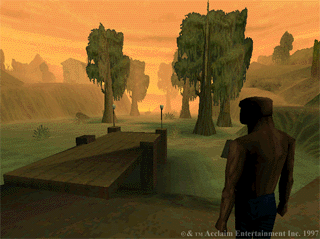 |
|
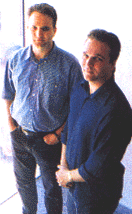 They even look alike. The brothers Falcus are justifiably proud of their latest PC/N64 creation, Shadowman. Like Turok, it has its origins in a popular comic. |
|
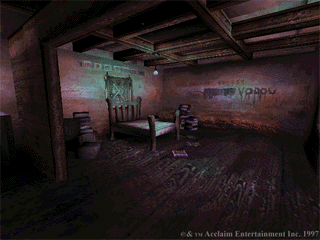 Shadowman looks even better than Turok, its atmospheric visuals putting it in the same class as current PC darlings Unreal and Daikatana. The comic on which it is based follows the life and loves of an undead voodoo assassin. |
|
 |
|
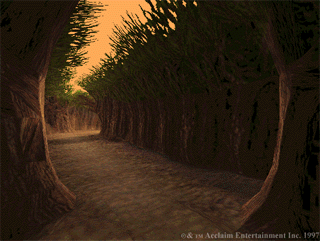 Shadowman's creative director, Guy Miller, claims that working on it is 'like writing for "The X-Files"... we can go wherever we want. There's a lot of crazy stuff in here.' |
|
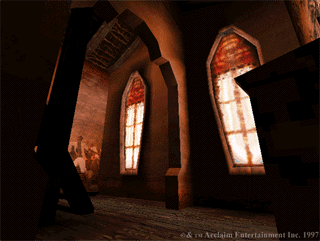 |
|
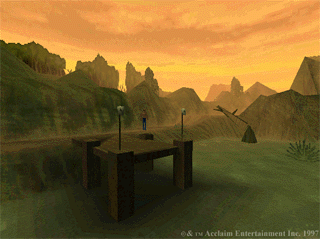 The 3D engine allows for some amazing scenes, reminiscent of Turok, but with a 'psycho horror' edge. |
|
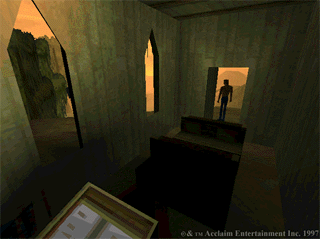 |
|
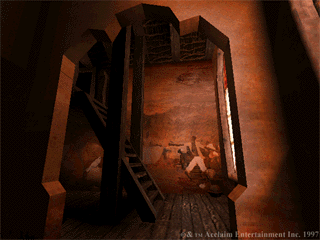 Shadowman will not be a game for the feint hearted. If it were a movie, it would owe much to Angel Heart. |
|
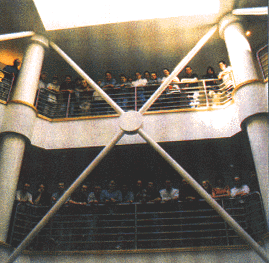 |